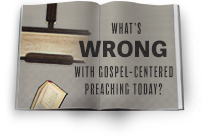I Was A Gospel-Believing Preacher Who Didn’t Preach the Gospel
I was a minister of the gospel who for many years did not preach the gospel to my flock. How did this happen? Let me back up.
It’s the early 1940s. Picture a zealous young man standing on a billiards table in the small western Pennsylvania town of DuBois, preaching the gospel to my father and his friends. My dad spent most of his spare time as a teenager in the pool hall, smoking cigarettes and losing money. He was raised in a liberal, mainline church. He’d never heard the gospel until a bold, self-appointed herald of the good news perched himself on a pool table and announced that “Christ died for the ungodly.”
The sermon yielded no immediate results, but the message of the cross was clearly delivered. The young preacher never saw the fruit of his labor; he was killed in World War II. But shortly after the war, God saved my newlywed parents—and for the rest of his life, my dad remained thankful for that young man who initially brought him the message of saving grace. He lived the rest of his days committed to the gospel. By trade, he was a top-40 radio DJ. He would sign off the air each day by saying, “This is your country cousin, Charles Archibald Moore, bidding you farewell and encouraging you to place your faith and trust in Jesus Christ and his precious blood.” He was never ashamed of the gospel, and always gauged the ability of a preacher based upon how many times he mentioned “the blood of Jesus Christ.”
Fast forward to 1961. I was born on the same day that my maternal grandmother was buried. At her funeral, that same gospel was preached and my uncle came to saving faith. All this to say that the gospel was the centerpiece of our family life long before I was born. I point this out not to boast, but rather to state that God graciously placed me in a home where the gospel was a priority. Eventually, God brought me spiritual life at the age of 16 when, upon hearing the gospel for the umpteenth time, the Holy Spirit regenerated me and granted repentance and saving faith.
My college years were spent aggressively sharing the gospel with the lost through the influence of a campus ministry. I graduated from the University of Georgia in 1984 and started my first ministry job two days later. I worked as an overzealous youth director, and my evangelistic efforts gave evidence that I was fully convinced that the power of God unto salvation is the gospel. Even though my methodology at the time was decisionalistic, my burden for those teenagers was heartfelt and genuine.
Thankfully, there was a major shift in my theology during this stage of life. The truths of reformed soteriology gripped my heart and my enthusiasm to rescue the perishing remained. In time, I earned an M.Div. and became the pastor of North Shore Baptist Church in Bayside, NY. If you were to listen to my sermons from 1984 to 2005—and I strongly suggest that you do not invest your time doing so—you would be hard pressed to find a single message in which I did not preach the gospel to unbelievers. I was raised with the gospel, I believed the gospel, I preached the gospel!
And yet, my sermons and my entire ministry were incongruent. There was always a portion of the message dedicated to the unbeliever. I told them in clear terms the necessity of coming in faith to Christ for eternal life. I have no regrets with respect to how I addressed the enemies of God. The gospel was in every message I ever preached, but there was a problem: it was confined to the unconverted. Once the obligatory outward call to salvation box was checked, I would then preach the rest of the sermon to believers. The spiritual growth portion of the message may have been true to the text, but it was almost always driven by moralistic and/or legalistic motives.
How could this happen? In my worldview, the gospel was for the unsaved—and only for the unsaved. The practical application for day-to-day Christian living was driven by long to-do lists and usually propelled by guilt and shame. The messages, which always included a “come to Jesus for salvation” commercial, were for the most part works-based, motivational speeches with chapter and verse support. This was sadly true because I didn’t grasp the fact that the gospel is for both the unsaved and the saved, for both evangelism and sanctification.
I was not intentionally withholding gospel help from the saints; I simply did not understand that the gospel is for believers. How could I have missed this when it’s so plainly obvious in the New Testament? I’ll never know the answer to this question. I can, however, liken it to my discovery of the doctrines of grace. When God’s sovereignty in all things was pointed out to me, I suddenly saw it everywhere in Holy Writ. It was as if someone had stolen my Bible in the middle of the night and inserted verses on every page which supported the glorious truth that “salvation is of the Lord.” Likewise, when it was brought to my attention that the gospel is for the saved, it was an equally profound revelation. Ironically, many of the verses which unequivocally support the fact that Christians need the gospel were verses that I had committed to memory as a child. This is why it is so important to teach not only what a verse says, but also what it means.
Speaking of means, the means that God used to bring this to my attention was a desire to learn about church planting. In 2005, I became acquainted with some men who were part of a Sovereign Grace church. I knew very little about their ministry at the time. I was aware that they had really good music and that they were very fruitful in church planting. When I was invited to attend a pastors’ conference in April of 2005, I went with the intention of learning something about how our church could be more effective in church planting endeavors in NYC. My intentions were noble, but God had something much more foundational in store for me.
At the time, I wasn’t highly skilled at overseeing church planting efforts and, sadly, that conference did nothing to elevate my abilities. To this day, fifteen years later, I remain comparatively deficient at church planting. However, I was graciously introduced to something infinitely more valuable, and that was the clear teaching in Scripture that the gospel is of first importance in the life of a child of God. At that conference, Pastor Mike Bullmore, from Bristol, Wisconsin, preached a sermon entitled “The Functional Centrality of the Gospel.” A light went on in my head and my life was forever changed. C.J. Mahaney’s little orange book, The Cross Centered Life, reinforced everything I learned at that conference. I was further helped by the writing of Jerry Bridges in his masterpiece, The Gospel for Real Life.
I still remember the profound, paradigm-shifting encounter I had with God and His Word. These truths which invaded my thinking and preaching also had a profound impact on my heart and ministry. I do not have a sufficient vocabulary that can adequately put into words the joy that flooded my heart when I came to see that every aspect of my life in Christ is defined by the fact that Christ, my Redeemer, suffered in my place and rose again for my justification. Once again, it was right under my nose all along, and I just didn’t see it.
Everything that I am saying can be demonstrated simply by reading the words that are written in the Bible. One need not have a special decoder in order to see that the gospel is for the regenerate. This glorious gospel reaches deep into all areas of one’s life. A fresh emphasis on the gospel will simultaneously bring both deeper conviction of sin and sweeter relief when applied to the soul. I had always lived with a very legalistic, performance-based value system. In my theology, the concept of “grace” always had a forensic emphasis with respect to my justification. To be clear, I still believe that! I just never could apply “grace” in day-to-day life until I saw the ways in which the gospel informs Christian living. These connections to Christ crucified radically changed the way that I lived, taught, and ministered.
When I introduced my newfound love for the gospel to my congregation, they immediately embraced it with joy. In fact, I don’t recall anyone putting up any resistance to the overarching priority that the gospel is of first importance. Fifteen years later, it is a delight to write this article and remember the story of how God touched my heart with these glorious truths.
Allow me to cite a few examples from Scripture as to how the gospel informed my thinking, preaching, and living.
- Giving: 2 Corinthians 8:9 “For you know the grace of our Lord Jesus Christ, that though he was rich, yet for your sake he became poor, so that you by his poverty might become rich.”
- Service: Mark 10:45 “For even the Son of Man came not to be served but to serve, and to give his life as a ransom for many.”
- Marriage: Ephesians 5:25 “Husbands, love your wives, as Christ loved the church and gave himself up for her.”
- Purity: 1 Corinthians 6:20 “For you were bought with a price. So glorify God in your body.”
- Forgiveness: Ephesians 4:32 “Be kind to one another, tenderhearted, forgiving one another, as God in Christ forgave you.”
It sounds so strange now, but, as I said at the beginning, I was actually a minister of the gospel who for many years did not preach the gospel to my flock.
Even now, I have a weekly (sometimes daily) battle to keep Christ and his gospel as the preeminent feature of my sermons and service. I’m well-served to continually be reminded of what Paul said to a group of Christians in Corinth: “Now I would remind you, brothers, of the gospel I preached to you, which you received, in which you stand” (1 Corinthians 15:1).
Why would the apostle have to give this reminder to people who already know it? Why would he have to stress this gospel (which is of first importance) to people who have already been saved by it? It’s because the gospel is not only the means by which we are saved, but it is also the means by which we walk through this life.
Colossians 2:6 “Therefore, as you received Christ Jesus the Lord, so walk in him.”
I always knew this verse, but I never knew this verse!
How did we receive Christ? Through the gospel! Likewise, through that same gospel we are to walk.
Examine your life, ministry, and sermons. Does the message of Christ crucified unmistakably characterize who you are? I, myself, need to re-ask this question on a regular basis. Hopefully a grace-filled, Spirit-led self-examination will sharpen your focus on the cross. And, hopefully, there will be a corresponding joy that accompanies this truth.









